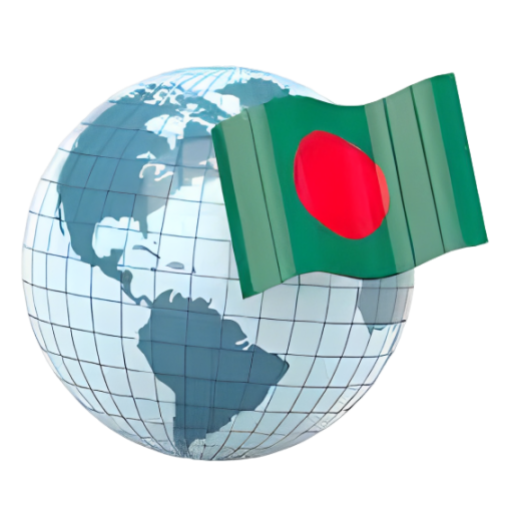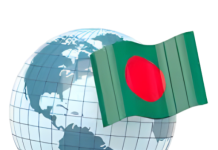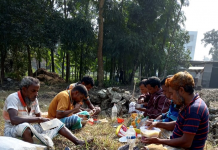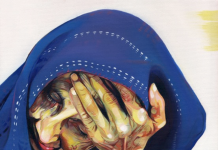In these short excerpts to be published for the first issue of Global Bangladesh, Tasleem Shakur and Shabnam Ahsan provide a few initial findings of their research on the Liberation Movement in NW England, based on the accounts of twelve interviewees who were active in 1971, in the old industrial cities of Manchester, Liverpool, Leeds, Bradford and Chester, among others.
Motivations and Methods
Ever since the early 1980s, when I and my late wife, Yasmin Shakur, became involved with Bangladeshi community activities in the north of England, I have been periodically requested to document the contribution of activists in the 1971 liberation movement in Manchester by one of its key figures and my good friend, Shamsuddin Ahmed. Having acquired some social anthropological skills as a Commonwealth Scholar, and later as an academic in the 1990s, I was keenly interested in this important field. However, due to a busy life as an academic with a young family, I was unable to make any time to undertake such a project on my own.
When Yasmin was sadly diagnosed with stage three cancer in 2004, we were both looking for opportunities to take early retirement. Living as an immigrant in the UK since the late 1970s, I wasn’t sure what I would do in the North West of England post-retirement. It was Yasmin who, one day during her illness, told me quite calmly: ‘Since you have always taught and researched on developing countries and ethnic minorities, why don’t you try going back to the Bangladeshi communities and see if you can encourage young students, while pursuing some research with them, in this part of England?’ I kept in mind what she said, but still couldn’t take any such decision while I was actively involved with her treatment in London.
Tragically, Yasmin breathed her last in 2016; I struggled to work as a university academic and finally retired in 2018. Still grieving for Yasmin, I attended the Bangladesh Independence Day at Manchester Bangladesh Assistant High Commission. There, I bumped into Ali, wearing an old tie with a Bangladeshi flag in the middle. It was quite an emotional moment for me when he described that the tie was almost 50 years old; it was made during the liberation movement days of 1971, in which he was actively involved. A few days later, I met Syed Ahmed Ali (Khashru Bhai), an adviser of British Bangladeshi Civil Society UK (BBCSUK), and as soon as I mentioned my intention to undertake a short and quick voluntary research project, he became excited, saying he had always wanted to undertake this work. He instantly assured me of all possible help in this project, which he thought was long overdue. Later, I called my old friend Shamsuddin Ahmed in Wales. Of everyone, Shamsuddin Bhai was probably the most pleased as he had been constantly reminding me of this work for probably two decades.
In 2019, I developed a questionnaire to interview some key people around the North West of England, to document their experience of this extraordinary movement, fifty years ago. With Khashru Bhai and Shamsuddin Bhai, we made a list of around a dozen key people from Manchester, Leeds, Bradford, Liverpool and Chester. All the interviewees were enthusiastic to talk about their treasured memories of ’71. However, I was reminded that a few of the leaders and key activists have sadly passed away in the last few decades. The most prominent of them were the main leader, Matin Shaheb from Manchester, who acted as an anchor person and support in sustaining the nine month-long movement; and the accountant, Rahman Shaheb from Southport, who acted as a young deputy to Matin Shaheb and kept the spirit up within the community. With Khashru Bhai, Shamsuddin Bhai and Councillor Ahmed Ali of BBCSUK, we managed to undertake 13 interviews with a few multiple interviews at locations in Manchester and Liverpool. On all occasions, we had a kind of mini-celebration with a few of the old key activists who were meeting again after long time, while the hosts enthusiastically provided meals. I should acknowledge, here, the great support from our younger son, Dr Faheem Shakur, and his wife Dr Anika Chowdhury who, despite their hectic GP (General Practitioner) practice, made time for hosting a few meetings at their home; Faheem cooked for the touring party while Anika took time off to come with us and video record a couple of our female respondents.
It was during the relatively fine summer of 2019 that we managed to do most of the interviews, along with amateur video and audio recordings of all the activists. In December 2019, I went to Bangladesh with a plan to interview one of the main student leaders and a key activist in Manchester, who had migrated back to his home town of Sylhet some years ago. Unfortunately, a deadly coronavirus suddenly started gripping different parts of the world and I had to hurry back to the UK. By March 2020 the virus had spread rapidly in Europe and in the rest of the world. During the global pandemic, Matin Shaheb’s son Shipar tried to help me in transcribing some of the interviews, by sending the tapes to Bangladesh. But the spread of Covid-19 in mid-2020 somewhat halted our progress in processing the interviews, and I started participating in the new growing phenomenon of Zoom meetings. In particular, I attended events on the preparations for ‘50 years of Bangladesh’. And this was where I met Shabnam Ahsan, a young mother of two, a teacher and research student from West Yorkshire of Bangladeshi heritage. While talking about our project, she instantly showed interest in helping me process the interviews and co-writing with me. This was what my late wife had suggested to me as my ‘retirement work’ more than a decade ago. It was the best thing to happen to this small voluntary project.
Initial Findings
“The stories and perspectives of the participants in these interviews are varied, and sometimes startling. But in the course of listening to them and recording their words, there are several common elements that emerged.
Firstly, the fact that most people were aware of political and economic dissatisfaction prior to 25th March. In particular, those who followed politics and current events seemed to be conscious that things were about to reach a boiling point. The atrocities of 25thMarch, with the Pakistan Army’s brutal crackdown on the city of Dhaka, aroused a real and sharp fear among East Pakistanis in Britain, for their families and loved ones back home. This was the turning-point, and it became the catalyst for many to begin organising the fundraising activities and demonstrations that were such a big part of the independence movement in the North West of England.
A second striking detail is the centrality of Bangladeshi-owned restaurants, and the key community figures who ran them, as spaces for meeting and organizing activists. The Manzil and Shalimar restaurants in the heart of Manchester, and the Kismet restaurant in Liverpool, played an important role in bringing like-minded people together on a regular basis. There are multiple stories of the venues being crammed with people in the evenings and on weekends, who had gathered to listen to speeches by influential figures like local businessman Matin Choudhury and Justice Abu Sayeed Choudhury. One fascinating snippet related by Dr. Motahar Khan is the fact that a musical group performed at the Kismet restaurant, producing a record of the evening which they later sold, with proceeds going to Bangladesh. Could it have been the famous former Beatle and Liverpudlian, George Harrison? Perhaps he was too famous by then to be performing in a local Indian restaurant in Liverpool, and it was more than likely another group trying to capitalise on the hype of Harrison’s Concert for Bangladesh in New York. Nevertheless, it shows the extent to which the issue captured the sympathies of so many.
One thing that must be acknowledged is the unquestioning generosity of ordinary East Pakistani workers – whether they were restaurant staff, factory workers, or simply students trying to make their way, they donated whatever they could to the cause. Several accounts mentioned that they did not know where the money was sent, while others clarified that it was deposited into a bank account in the name of Justice Abu Sayeed Choudhury. The involvement of the Labour MP John Stonehouse was brought into question in the light of his disappearance several years later. However, there was never any proof of fraud, and the money that was handed over to Justice A. S. Choudhury became the first foreign revenue of the newly formed country.
It seems evident that there were mixed feelings about the liberation movement from other communities. The white, English community appeared indifferent at first, particularly with regard to the politics involved. There were pockets of support around the North West, but these were mainly from church groups who were motivated to support the unfolding humanitarian crisis, rather than having any political views on whether Bangladesh should be an independent state. That said, there are accounts of individuals who were involved in the political activism and fundraising alongside the Bangladeshi community. These often included people who were linked to the Bangladeshi community in some way, such as Mrs. Elizabeth Wahid, and Mrs. Barbara Choudhury. There was also support from friends from other cultural communities, such as those who happened to be Indian or Middle Eastern.
On the other hand, the West Pakistani community were predictably hostile to any mention of Bangladesh independence, and relations between members of the two communities were often strained – sometimes even to the point of physical threat […].
Once the issue began to escalate, politicians and the British government, who had up to now supported West Pakistan, began to take note, with certain Labour M.P.s in particular offering their support. Professor Kabir Choudhury tells us that the Foreign Secretary, Sir Alec Douglas-Home, would grant an audience to Justice A. S. Choudhury and certain people who were close to him, and seemed to be sympathetic to the plight of the Bangladeshis. Labour MPs whose names repeatedly come up as supporting the movement, include John Stonehouse, Bruce Douglas-Mann and Peter Shore.
National and local media appeared to play an important role in keeping people informed, in particular the BBC World Service, although many of the interviewees say that initially the reporting was sparse. Later, in-depth reports in national broadsheets by journalists such as Simon Dring were devoured and filed away in people’s minds. There are also items in local newspapers which give a glimpse of the extent to which the issue was in the national consciousness. There are articles proclaiming ‘War in East Pakistan,’ not necessarily front page news, but small articles, barely taking up a quarter of a page. There are reports in the Runcorn Daily News of an English woman from Frodsham going on hunger strike in protest at the British Government’s failure to recognise Bangladesh. The Liverpool Echo reported on students from Liverpool University who also went on hunger strike. And of course, there is the story of Dr Salam and his fellow student protesting at Park Avenue Cricket Ground in Bradford, while the West Pakistan cricket team was playing, which was reported on in local and national newspapers such as the Daily Mirror.
Despite the bloodshed and bitterness of the conflict, when liberation was officially announced, it seems to have been unanimously greeted by Bangladeshis as a cause for celebration. Our interviewees spoke of the joy and elation they felt as being beyond words. They celebrated wherever they could, with friends, family or whoever happened to be around them. However, there was a niggling doubt among some about the role India played – the legacy of which continues; for instance, how was it that the majority of the fighting had been carried out by Bangladeshi fighters, and yet the surrender was signed in the presence of the Indian General Aurora Singh, rather than a representative of Bangladesh? Would Bangladesh, a small country, be swallowed up by the interests of India on her borders, without the presence of Pakistan on the other side? Whether that is in effect what is happening now, is a matter for debate.
Nonetheless, one thing is clear; despite the elation on 16th December, 1971, the experience of a liberated Bangladesh has not been everything they hoped. When asked why they think that is most of the interviewees cite poor leadership, partisan politics, an unwillingness on the part of political leaders to act for the greater good. And yet, there is no sense of regret. You get the feeling they would do it again, if they had to. All of them emphasise that they became involved in the movement for love of their country, out of a desire to correct wrongs; not in the hope of recognition or glory. That said, it seems only fair that these people and their efforts on what was essentially the British frontier of the liberation struggle, should be given the recognition and appreciation they deserve.
As the interviewees reflect on fifty years of independence, they talk about how far they and their families have come; from the days of struggling in low-paid jobs and experiencing overt racism to seeing their children and grandchildren born and raised as British Bangladeshis, graduating with degrees from university, working in professional fields, and achieving higher levels of social and economic status. Although the trade-off seems to be that the younger generations are perhaps inevitably losing some of the links with their Bangladeshi heritage (Bangla language skills in particular). Still, there appears to be a strong sense among many of these young people of their distinct identity as British Bangladeshis.”
Extracts from Stories of ‘71: Reflections on the Bangladesh Liberation Movement in the North West of England, by Tasleem Shakur and Shabnam Ahsan, to be published by ‘Knowledgists Without Borders’ in collaboration with the ‘British Bangladeshi Civil Society UK’. The authors would like to acknowledge the great help and support from Syed Ahemed Ali and his team of BBCSUK in the organization and undertaking of the interviews.

Dr Tasleem Shakur FRSA FBIP is a retired English University academic. He taught and researched in Architecture, Urban Planning, Development studies and Human Geographies at Liverpool University, Oxford Brookes, University of Sheffield, School of Oriental and African Studies (Soas) University of London and Edge Hill University, Lancashire UK. At Edge Hill he was also the Director of ICDES (International Centre for Development & Environment Studies) between 1992 and 2012. In the early 1990s he was a Visiting Professor at Istanbul Technical University (ITU) and Kuwait School of Architecture. He edits GBER (Global Built Environment Review) and SACS (South Asian Cultural Studies). Currently he co-ordinates ‘Knowledgeists Without Borders’ a voluntary research, training and publishing house at Dhaka, Bangladesh.

Shabnam Ahsan is a third-generation British Bangladeshi from West Yorkshire. She graduated in English and Modern Languages from the University of Oxford. She is a qualified secondary school teacher and is currently pursuing a PhD in Children’s Literature at the University of Hertfordshire. Her involvement in this project came from her interests in writing, education, Bangladesh history and South Asian diaspora experiences.




